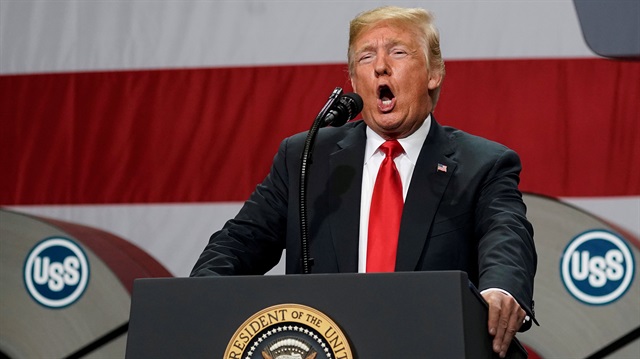
President Donald Trump stepped up his onslaught on federal Special Counsel Robert Mueller's probe into Russia and the 2016 U.S. election on Tuesday, saying that his campaign did not collude with Moscow but that collusion is not a crime anyway.
Trump launched his new attack hours before his former campaign chairman, Paul Manafort, was due to go on trial on tax and bank fraud charges in Virginia. As the first trial in the 14-month Russia probe, the case throws a fresh spotlight on an investigation that has dogged Trump's presidency.

Mueller is investigating whether Trump campaign officials worked with Moscow to try to sway the 2016 U.S. presidential election, something commonly referred to as collusion by the media and public officials.
"Collusion is not a crime, but that doesn't matter because there was No Collusion (except by Crooked Hillary and the Democrats)!" Trump wrote on Twitter.
While collusion is not a technical legal charge, Mueller is probing any coordination between the Russian government and the Trump campaign, and could bring conspiracy charges if he finds that any campaign member worked with Russia to break U.S. law.
Trump has denied any collusion for months. On Tuesday, he echoed his personal lawyer, Rudy Giuliani, who said in television interviews on Monday that collusion is not a crime. The strategy may be the latest in Trump's efforts to strip legitimacy from the Mueller probe, which he has long denounced as a "witch hunt."

Legal experts said that working with a foreign national with the intent of influencing a U.S. election could violate multiple laws.
A campaign finance law makes it a crime to solicit a "contribution or donation of money or other thing of value" from a foreign national in connection with an election, which could include opposition research.
"Collusion is basically a partnership in crime, which is conspiracy," said Randall Eliason, a former federal prosecutor and a law professor at George Washington University.
Trump has denied that the campaign worked with Russia to try to engineer his victory against Democratic candidate Hillary Clinton and bristles at the suggestion he might owe his White House victory to Moscow.
Russia has denied the finding of U.S. intelligence agencies last year that it interfered to sway the election to Trump.
"As a matter of law, the central question is not whether members of the Trump campaign coordinated or colluded with Russia, but whether they conspired with Russians to break a criminal statute or they broke the law themselves," the Council of Foreign Relations wrote in a background paper.
That could include hacking into Democratic Party computers, it said. "'Collusion' and 'coordination' are not legally relevant terms, but they are often used as shorthand to refer to such a criminal conspiracy," it said.
Manafort, 69, faces 18 criminal counts, which center on allegations that he hid much of the $60 million he earned working for a pro-Russian politician in Ukraine in undisclosed overseas bank accounts and failed to pay taxes on it.
A Manafort conviction would give momentum to Mueller, who has indicted or secured guilty pleas from 32 people and three companies since the probe started 14 months ago.









